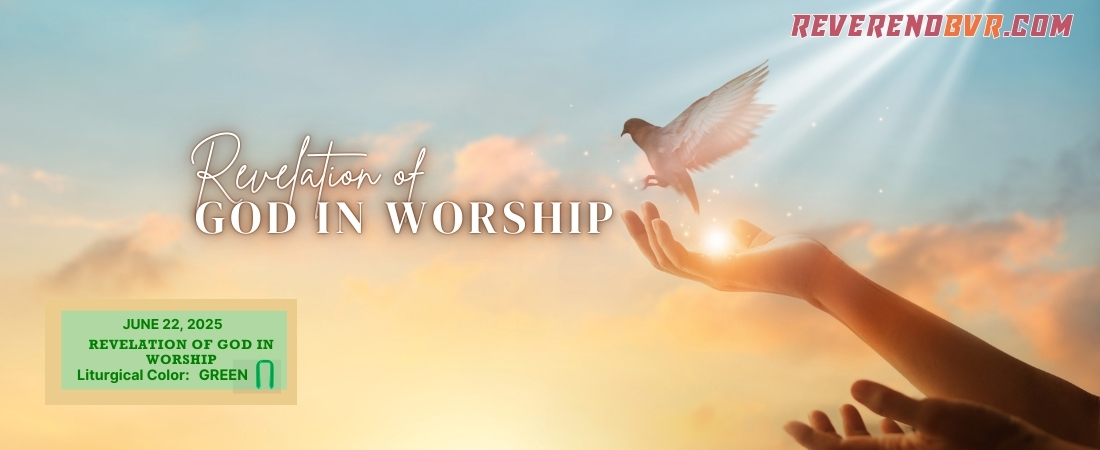True worship is not a performance or emotional escape but a sacred encounter where God reveals His glory, heals the soul, and reorients life toward His holiness. As Solomon prayed, worship begins with reverent attentiveness to the God who hears, forgives, and transforms through His revealed presence (1 Kings 8:28).
“Yet give attention to your servant’s prayer and his plea for mercy, Lord my God. Hear the cry and the prayer that your servant is praying in your presence this day.” (1 Kings 8:28).
Introduction
Worship is the essential and eternal posture of the human heart toward God. Yet in our present generation, worship is often misunderstood—reduced to emotional experiences, musical performances, or energetic gatherings.
Biblical worship, however, is not primarily about human expression; it is about God’s self-revelation. Worship is the divinely appointed encounter where God reveals His glory, renews the human spirit, and reorients life around Himself.
In true worship, we do not chiefly seek to express ourselves—we come to behold the living God who graciously unveils His character and presence to us.
Drawing from the breadth of Scripture—from Solomon’s dedication prayer, to the heavenly visions of Revelation, to Christ’s healing ministry—this message explores what worship truly is, what it is not, and how we must respond in spirit and in truth.
1. The Nature of True Worship: Biblical Foundations
Worship Defined – In both Hebrew and Greek Scriptures, multiple terms for worship unveil its depth:
- Hebrew “Shahah” (שָׁחָה) — to bow down, to prostrate oneself (Genesis 18:2).
- Greek “Proskuneo” (προσκυνέω) — to kiss toward, to show reverence (Matthew 4:10; John 4:21-24).
- Sebomai — reverential awe (Matthew 15:9).
- Latreuo — sacred service or religious devotion (Philippians 3:3).
Worship, at its core, is the full-souled response to the revelation of God—adoration, submission, and devotion to the One who makes Himself known.
It is not a passive attendance at religious events, nor a spectator sport where the audience consumes performances.
What Worship Is Not
- Worship is not entertainment: Music, while an integral aid to worship, must not replace the posture of the heart. True worship is an offering, not a consumption.
- Worship is not emotionalism: Emotions may accompany genuine worship, but emotional experiences are not themselves evidence of true spiritual engagement. We worship God with our renewed and cleansed minds, not with our fleeting emotions. Emotions are wonderful things, but unless they are shaped by a mind saturated in Truth, they can be destructive, out-of-control forces. Where the mind goes, the will follows, and so do the emotions. First Corinthians 2:16 tells us we have “the mind of Christ,” not the emotions of Christ.
- Worship is not confined to a place or style: As Jesus declared, “a time is coming when you will worship the Father neither on this mountain nor in Jerusalem… true worshipers will worship the Father in the Spirit and in truth” (John 4:21-23).
Worship as Revelation – Worship, rightly understood, is the sacred space where God chooses to reveal Himself. As Solomon recognized at the dedication of the temple (1 Kings 8:27), though “the heavens, even the highest heaven, cannot contain” God, He graciously draws near to His people, making His presence known.
2. Biblical Illustrations of Worship
Throughout Scripture, worship is consistently presented not as a human invention but as a divine revelation—God graciously revealing Himself so that we might respond in awe, repentance, and love.
a. Solomon’s Prayer of Dedication (1 Kings 8:22–30) – Solomon’s prayer highlights two key aspects:
- God’s Transcendence: “Will God really dwell on earth?” (v.27) reminds us that worship must always approach God with awe.
- God’s Immanence: Despite His transcendence, God listens, forgives, and answers prayers offered in humility.
The temple was not a magical structure but a focal point for God’s covenantal self-revelation among His people. Likewise, our churches today are not ends in themselves but means by which God engages our hearts.
b. Cosmic Worship (Psalm 148) – Psalm 148 draws the created universe into the act of worship:
- Heavenly beings, natural forces, animals, and humanity all join in exalting God.
- Worship is not confined to human expressions but is the vocation of all creation.
- The psalm reminds us that worship is God-centered, celebrating the revelation of His majesty (v.13).
c. Heavenly Worship and Proclamation (Revelation 14:1–7)
John’s vision reveals:
- Worship is the anthem of the redeemed—those who belong to the Lamb, marked by holiness and truth (Rev. 14:4-5).
- Worship encompasses both adoration and proclamation: “Fear God and give Him glory… worship Him who made the heavens, the earth, the sea and the springs of water” (v.7).
Here, worship is cosmic, communal, and centered on the unveiled glory of the Creator.
d. Worship and Healing (Mark 3:1–6) – When Jesus healed the man with the withered hand within the synagogue, it signaled that:
- Worship must be life-giving.
- Worship is restorative, not restrictive.
- Sabbath worship is not about legalistic conformity but about embodying God’s redemptive revelation.
Jesus’ act teaches that mercy and transformation are central marks of God’s presence in worship.
3. Contemporary Misconceptions and Challenges
Today’s generation often equates worship with:
- Musical genres (e.g., “worship” being only slow songs, “praise” being fast).
- Stage performances rather than communal participation.
- Emotional highs instead of spiritual depth.
Such trends risk displacing God as the center, replacing Him with human experience. When worship becomes man-centered, God’s revelation is obscured.
Thus, we must recover the biblical vision: worship is an offering, an encounter, a response to the revelation of the living God.
4. Worship Applied to Life Today
- Personal Renewal: Commit daily moments to bow in adoration—not just through music, but through Scripture reading, prayer, and silence before God. Seek His face.
- Corporate Authenticity: Engage actively in communal worship services, remembering that the “audience” is not the congregation but God Himself. We gather to encounter Him together.
- Mission in Worship: Allow worship to overflow into service—healing the broken, proclaiming the Gospel, and living justly.
True worship reveals God’s heart to the world through His people.
Conclusion: The Marks of True Worship
As Scripture testifies, worship is the point at which heaven and earth intersect, where the human heart, humbled and receptive, meets the divine presence that is holy, just, and glorious. To discern the difference between false and true worship, we must assess not merely external forms but spiritual substance. Below is a comparative schema highlighting this distinction:
| S.No | Feature | False Worship | True Worship |
| 1 | Focus | Entertainment, self-gratification | God-centered adoration |
| 2 | Emotion | Pursued as an end | A natural response to divine revelation |
| 3 | Expression | Performance-driven | Heartfelt and Spirit-led |
| 4 | Purpose | Temporary thrill | Lifelong transformation through divine encounter |
| 5 | Fruit | Superficiality | Holiness and justice |
True worship is the ongoing encounter with the God who reveals Himself in glory, holiness, and love—an encounter that transforms us into His likeness. As the apostle Paul declares, “And we all, with unveiled face, beholding the glory of the Lord, are being transformed into the same image from one degree of glory to another” (2 Corinthians 3:18).
This is the telos (τέλος) —the ultimate goal—of true worship: that the worshiper might be conformed to the image of Christ, living lives marked by justice, mercy, and holiness, all to the glory of God alone.
Closing Prayer
Almighty and Eternal God,
You are the One who dwells in unapproachable light, yet You have revealed Yourself to us through Christ our Lord. Teach us, O Lord, to worship You in spirit and in truth. Forgive us when we seek experiences over Your presence, when we exchange true devotion for shallow entertainments. Let our worship be a living sacrifice—holy and pleasing in Your sight. Reveal Your glory to us afresh, that through adoration, prayer, and obedience, we may encounter Your majesty, be transformed into the likeness of Christ, and reflect Your light in a darkened world. In the name of the Father, and of the Son, and of the Holy Spirit. Amen.
Bibliography
- Carson, D.A. Worship by the Book. Grand Rapids: Zondervan, 2002.
- Peterson, David. Engaging with God: A Biblical Theology of Worship. Downers Grove: InterVarsity Press, 1992.
- Wright, N.T. For All God’s Worth: True Worship and the Calling of the Church. Grand Rapids: Eerdmans, 1997.
- Block, Daniel I. For the Glory of God: Recovering a Biblical Theology of Worship. Grand Rapids: Baker Academic, 2014.
© 2025 ReverendBVR.com | High-Academic Sermon Series, 2025.
Content licensed under Creative Commons Attribution-NonCommercial-NoDerivatives 4.0 International (CC BY-NC-ND 4.0). You are free to share — copy and redistribute the material in any medium or format with proper attribution. No commercial use or modifications allowed without explicit permission.
For further sermons and biblical reflections, please visit 🌐 www.reverendbvr.com/sermons

